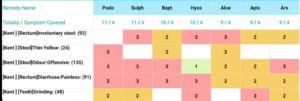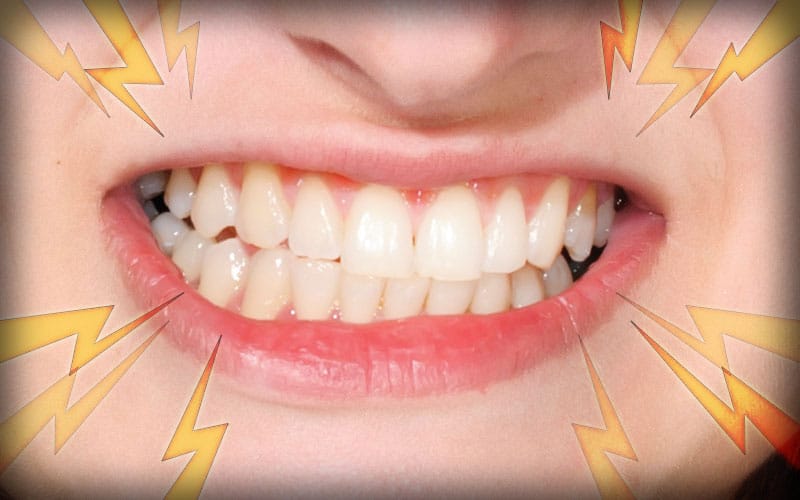Bruxism – It is a condition in which excessive grinding, gnashing & clenching of teeth occurs unconsciously.
Types
1. Awake bruxism – unconscious grinding of teeth when awake
2. Sleep bruxism – As the name suggests, clench or grind teeth while sleeping. It is most likely associated with other sleep disorders like snoring and sleep apnea.
Risk factors
• Emotions like anxiety, anger, frustration, fear can be the reason behind grinding of teeth. It may be a coping strategy or habit during deep concentration.
• Age: Common in young children
• Genetic: Runs in families
• Personality: More seen in aggressive, hyperactive and competitive personalities.
• Drugs: Certain psychiatric medications (antidepressants), recreational drugs may have this side effect. Tobacco smoking, alcohol, strong caffeinated drinks may increase the risk.
• Medical disorders: Associated in cases of Parkinsonism, dementia, gastroesophageal reflux disorder (GERD), epilepsy, night terrors, sleep apnoea and ADHD.
Signs and symptoms
- Damage to teeth, crown or jaw. Teeth may get flattened, fractured, chipped or loose due to excessive grinding
- Tooth enamel may worn out, exposing deeper layers of tooth which may give rise to toothache / increased sensitivity.
- Tired or tight jaw muscles, or a locked jaw that won’t open or close completely. Disorders that occur in the temporomandibular joints (TMJs), located just in front of your ears, which may sound like clicking when you open and close your mouth
- Severe jaw or facial pain
- Tension headache or Dull headache especially temples
- Damage from chewing on the inside of your cheek
- Sleep disruption
Mild cases of bruxism may not require treatment. However, frequent and severe forms of bruxism should not be ignored as it may lead to jaw disorders, headaches, damaged teeth and other complications.
Case of Bruxism cured with Podophyllum
A male schizophrenic patient aged 55 years brought to my OPD with his attendants.
Chief complaint
Frequent, involuntary loose stools since 15 days
Frequency of Stool: 5-6 times in a day.
Character of stool: watery stools, highly offensive odour+++, yellow in colour, painless passage of stools in clothes (day and night)
Since it was a case which belongs to the category of mental diseases (schizophrenia), it is difficult to take out the subjective symptoms from the patient himself like his sensations, feelings, desires, dreams etc.
On further enquiry to the attendants, it was found that he has been taking psychiatric drugs since ages otherwise they described him to be very aggressive in his behaviour. The psychiatric medicines kept him calm and composed.
Appetite was average
Thirst is good
Sleep – sound sleep for 7-8 hours
My observation –
The loud grinding of teeth which is continuous since the patient entered my chamber. This is the most characteristic, peculiar and persistent symptom which I observed along with other symptoms.
Remedy Selection –
With the above data, Repertorization was done to find out his simillimum. The following symptoms were considered-
1. Involuntary stools
2. Yellow stools
3. Offensive stool
4. Painless diarrhoea
5. Grinding of teeth
The remedies ranked highest in the repertorization were found to be Podophyllum, Sulphur, Baptisia, Hyoscyamus, Aloes etc.
Repertorization Chart –

Prescribed Remedy:
Podophyllum 30C/ 3 doses OD
Followed by placebo for 5 days.
Reason to select Podophyllum –
After repertorization, I refer to the materia medica written by E B Nash, which includes that Podophyllum is wonderful remedy for liver complaints especially for diarrhoea which is profuse, painless, putrid and with great prostration. Peculiar symptom of Podophyllum patient that made me to choose this remedy was the constant desire to grind the teeth along with his complaint.
Podophyllum is known for its 5 ‘P’s –
1. Putrid
2. Painless
3. Profuse
4. Prostration
5. prolapse
Result –
Marked improvement was seen
He has got controlled over his bowels, no more involuntary passage of stools in clothes
Frequency of stools reduced to 2-3 times per day
Grinding of teeth vanished to my surprise.
Conclusion –
Homeopathy has no limits, each remedy has its own benefits weather it is acute/ chronic or polychrest remedy. Understanding of case is important, individualization is must which demands patience, keen observation, sound senses and fidelity in tracing out the picture of disease.
Author –

Dr Shweta Singh, MD (HOM)
Senior Consultant: Orbit Clinics
Medical Director: Muskan Foundation, India
Assistant Professor: Organon of Medicine & Homeopathic Philosophy
Chief Administrator: KHA Homeopathy Study Group, USA
Vice President: Delhi Homoeopathic Medical Association, India

